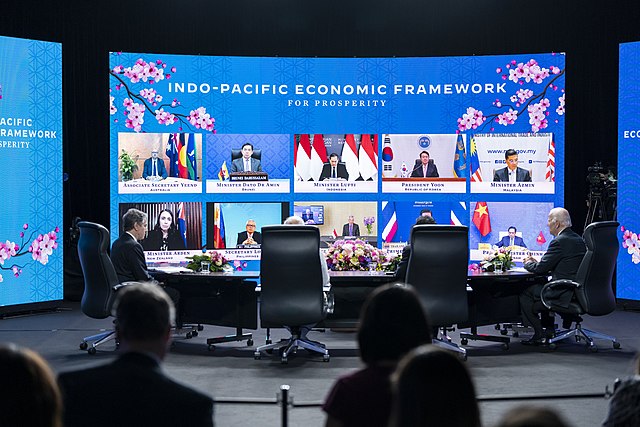 President Biden meeting with world leaders at the Indo-Pacific Economic Framework, courtesy of the Office of the President of the United States
President Biden meeting with world leaders at the Indo-Pacific Economic Framework, courtesy of the Office of the President of the United States
Rebalancing the Indo-Pacific: Vietnam and Critical Minerals
The Biden administration recently concluded the second round of negotiations on its Indo-Pacific Economic Framework (IPEF). While the scope of the agreement is broad and tailored to balance China’s influence in the region, it acknowledges that the shared success of the region greatly depends on “transformations afoot in the clean energy, digital, and technology sectors,” which rely heavily on critical mineral supply chains dominated by China.
This is a major building block in Biden’s effort to strategically compete with China by strengthening relationships and building alliances. Sustainable development, and critical minerals specifically, are an emerging area of strategic competition with China for economic influence in the Indo-Pacific. As the U.S. and others seek to simultaneously diversify supply chains and stem China’s influence, a stronger relationship with Vietnam is an emerging opportunity to make gains in both areas, but questions about the country’s human rights record remain.
Vietnam is poised to become a major player in the clean energy market. It has the second largest reserves of rare earth elements (REEs) in the world, making it the obvious next choice for diversifying the REE supply chain from China. Having been unable to take advantage of these deposits, Vietnam has begun to accept foreign direct investment to develop these resources. Furthermore, with rising Chinese labor costs, Vietnam is becoming an important production hub for electronics and is currently the third largest producer of solar PV modules.
To grow in the global clean energy market, Vietnam must attract investment to expand its projects. The IPEF could be beneficial in this regard, setting specific targets and regulations necessary to coax private funding to Vietnam. Simplifying the permitting process and allocating funds to reduce the risk of major projects are not only important for resource-abundant countries to develop their supplies but will also help diversify critical mineral supply chains. Despite concerns over transparency and regulation with Vietnam’s one-party state, foreign investment in Vietnam has been fairly robust, and the U.S. has signaled its desire to strengthen ties with the country. This trend has recently been joined by a more favorable view of the U.S. and other Quad members’ involvement in the region, spurred by aggressive Chinese actions in the South China Sea (SCS).
Geostrategy in Southeast Asia is shifting, and critical minerals are bringing new dynamics to old relationships in the region. For example, the announcement of the Ministerial Dialogue between Vietnam and Australia concerning, among other things, the exchange of information and promotion of trade in the mineral and energy sectors of both countries. Australia’s technical mining expertise could help develop Vietnam’s underutilized mineral deposits and loosen China’s control of the REE supply chain. Additionally, India, which recently agreed to a deal with Australia over critical minerals, has also pursued tighter relations with Vietnam, not only to protect its interest in the SCS but to develop energy and mineral exploration.
These moves towards closer ties with the Quad countries have brought scrutiny from Beijing, putting Vietnam in a delicate geopolitical position because of its reliance on Chinese imports despite leading Asia in economic growth coming out of the pandemic. As a result, Hanoi has been reluctant to officially upgrade U.S.-Vietnam relations, yet it has strengthened military and trade relationships with Australia, India, Japan, and South Korea. The lines between national, energy, and economic security are becoming more intertwined, and shared concern for regional and critical mineral supply security is forging a new interest in Vietnam.
Strengthening ties with Vietnam, also presents a challenge to the Biden administration’s core foreign policy values of human rights and anti-authoritarianism. Concerns over human rights abuses in Vietnam persist today, and growing engagement with the country continues to produce thorny questions about how to counter China’s influence and secure supply chains without compromising U.S. credibility on its criticisms of human rights abuses around the world.
Currently, Vietnam is espousing the intention to improve its human rights law without making any real progress. There is little the U.S. can do offensively to motivate Vietnam to make reforms without driving it closer to China. Instead, opting for incentivization and diminishing Vietnam’s reliance on China is more likely to lead to reform over the long term. Although, as we have seen with China’s development, economic prosperity leading to liberalization is not a forgone conclusion. While not perfect, opting for favorable investment strategies that are tethered to improvements on human rights is a more viable option than punitive action. The IPEF offers a chance, if handled correctly, to make progress on strategic competition and clean energy while galvanizing greater action on commitments to human rights.






